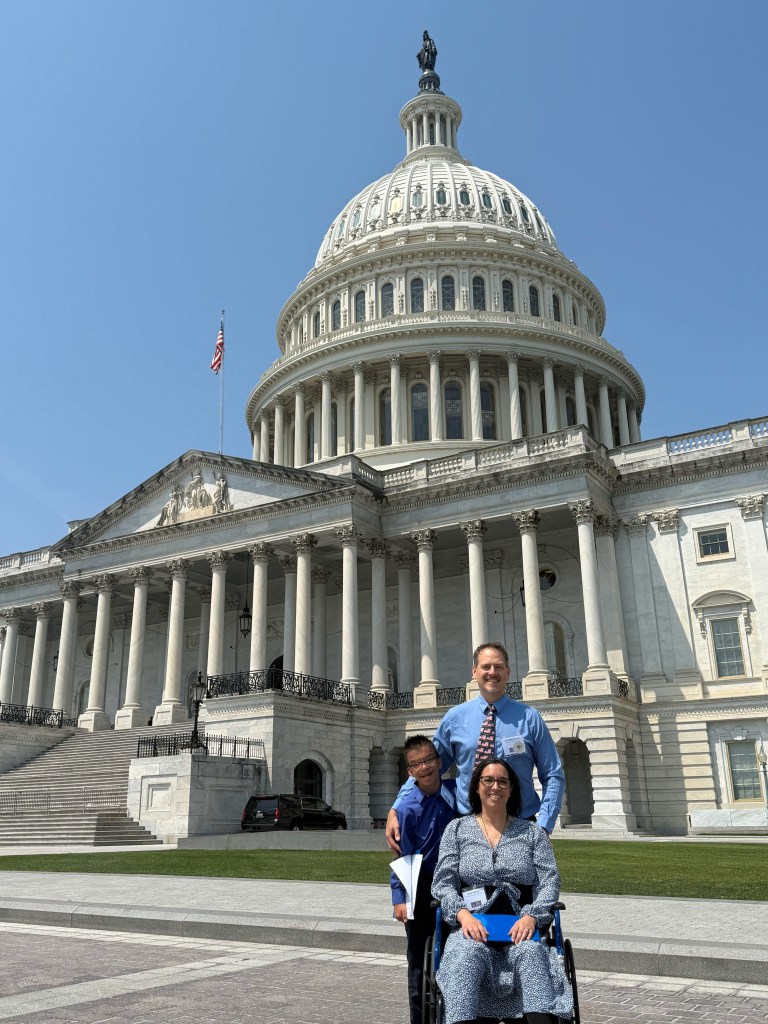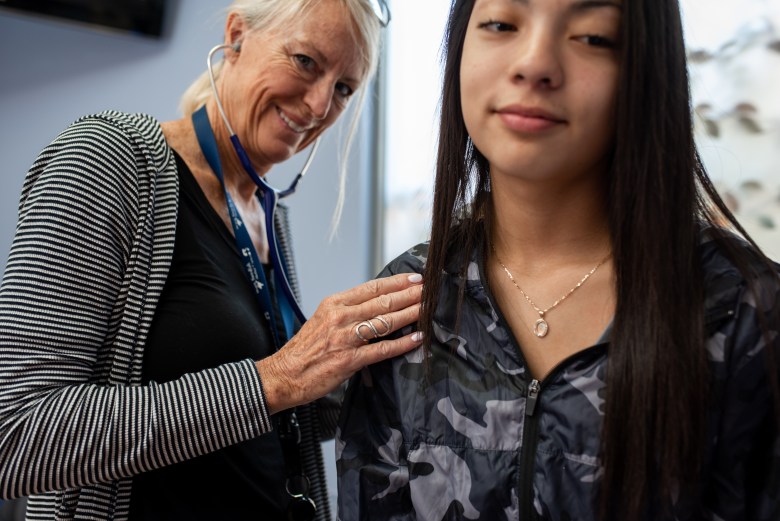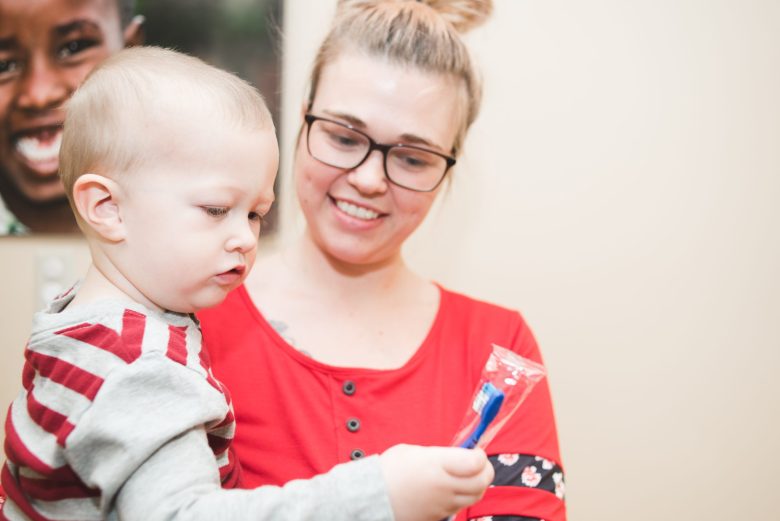Tim and Kara Norick of the Littleton area adopted their second-youngest son of six children, Malakai, from China in 2016, when he was almost 3 years old.
Malakai was found on a bridge in China at just days old in dire medical condition and was rushed to a hospital in Shanghai, where he was diagnosed with severe pneumonia, organ failure and other complex medical conditions.
After almost three years in an orphanage, Malakai was adopted and brought to join his new family near Littleton.
After being treated at Children’s Hospital Colorado, Malakai was diagnosed with Opitz G/BBB Syndrome — a rare condition affecting the entire midline of his body.
“Think about anything that crosses through your midline like your digestive system, your trachea, your lungs, even your eyes and your nose, are all impacted by the syndrome,” Tim Norick said.
Now almost 12, Malakai has undergone several surgeries and treatments, and even received a custom-built larynx, or “voice box.”
The Noricks have private health insurance to keep up with Malakai’s medical costs and use Medicaid, or government issued health insurance, to supplement.
“Children’s Hospital gave us a caseworker off the bat and we were very grateful for that because they were able to do a lot of the front work (setting up) Medicaid support (which) we’ve had since the very beginning,” Kara Norick said.
Medicaid helped cover costs for Malakai’s growth hormone medication, something the Noricks’ private insurance wouldn’t pay for.
Additionally, Kara Norick said their primary insurance paid for feeding tubes, but not for Malaki’s Malone tube, a small tube that empties bowels. Medicaid paid for Malakai’s Malone tube equipment.
Because of the several times Medicaid was able to cover costs for Malakai’ health, the Noricks are avid supporters of preserving Medicaid.
As part of Children’s Hospital Association’s Family Advocacy Day, the Norick family recently traveled to Washington, D.C., with 60 other patients and their families to advocate for preserving Medicaid amid the potential cuts being debated in Congress. Kara Norick said she was impressed with how legislators spoke with Malakai and made him feel valued.

“It was a breath of fresh air to see how truly bipartisan things can be,” she said.
Medicaid under the ‘big, beautiful bill’
The budget consolidation bill, H.R.1, commonly referred to as the One Big Beautiful Bill Act, was introduced by House Republicans. It aims to “reduce taxes, reduce or increase spending for various federal programs, increase the statutory debt limit, and otherwise address agencies and programs throughout the federal government,” according to the bill’s language.
Ranging from tax cuts to implementing new work requirements to qualify for Medicaid and SNAP, Congress passed the bill on a 218-214 vote on July 3 and President Donald Trump signed it a day later.
The Congressional Budget Office estimated that H.R.1 would decrease federal Medicaid spending by $793 billion because of new work requirements that the office said would cut insurance coverage for 10.3 million people nationwide.
According to WhiteHouse.gov, the bill will strengthen “the integrity of Medicaid by eliminating waste, fraud and abuse.”
Kara Norick said she worries about keeping Malakai on his necessary medications as he gets older.
“We are proponents of trying to be as independent as you can,” Kara Norick said. “But unless I am making (the medicine), administering it, doing everything, it’s seen as: ‘oh, he’s independent, he doesn’t need it.’”
The local Medicaid battle
For Doctors Care, a nonprofit clinic in Littleton, the cuts to patients’ Medicaid coverage could cost the clinic thousands. The organization is currently losing $20,000 per month in Medicaid funds from the now-ended Public Health Emergency’s Continuous Coverage Unwind that was established in response to the COVID-19 pandemic.
The clinic doesn’t turn away anyone who can’t afford a visit and uses a sliding fee scale, for which the price of services and medication are adjusted to what a patient can pay. Currently, 30% of Doctors Care’s patients are uninsured.
“We’re going to see another 5-to-15% of people who will become uninsured, and that just places so much pressure on the overall healthcare system,” said Bebe Kleinman, CEO of Doctors Care.
Elizabeth Hockaday, Doctors Care’s development and marketing director, said while the clinic will continue its mission of serving all patients regardless of insurance status, the lack of income has pushed the facility to rely on donations.
“Charitable giving can be just as volatile sometimes as whatever is happening in politics and the stock market,” Hockaday said.
Kleinman said Doctors Care’s partners with other nonprofits that offer resources for food, housing and community engagement are also in a vulnerable position.
“In previous years when budgets have been in crisis, there might be one partner that is in a dip,” she said. “But what we’re seeing now is that there’s really no part of the community safety net that isn’t under attack. That’s very impactful to the patients we serve.”

Since H.R.1 would also seek to decrease federal spending on SNAP, Kleinman said she is worried about people losing food resources, which would affect the health of many. Patients who have access to nutritious food, have housing and are employed are easier to care for than when they wait too long to see a doctor due to medical costs and become very sick, according to Kleinman.
Hockaday said the stress put on the healthcare system then impacts nurses, doctors and other hospital staff who become quickly burned out from treating an influx of sick and diseased patients.
Colorado Access is a nonprofit public sector health plan that exclusively serves public programs like Medicaid and children’s health insurance. Colorado Access CEO Annie Lee said the company acts as a connection point between the state, Medicaid providers and its members.
“The work requirements in the reconciliation bill is a huge concern,” she said. “This is a big administrative burden to be placed on states.”
Lee said in 2023, when the Public Health Emergency Unwind ended, 800,000 Coloradans lost Medicaid coverage. According to the Urban Institute, at least 120,000 Coloradans are expected to lose coverage due to the introduction of Medicaid work requirements alone, with more likely mistakenly disenrolled.
“When people can’t access health care, they’re getting sicker until they get care, usually at the emergency department … people shouldn’t wait until they’re terribly sick to get care — and when it’s the most expensive care,” she said.
The cost of expensive medical intervention that is not compensated begins a ripple effect on the healthcare system, Lee said.
“Having our members lose coverage is painful and it’s also painful to know that our providers will not be able to access the kinds of revenues that they need in order to stay afloat to continue serving their communities,” she said.
Both Lee and Kleinman said they are “weathering the storm of uncertainty” each day, waiting to see if the bill passes and how soon changes will be ordered.
They addressed the perception that Medicaid is an abused welfare resource.
“Medicaid saves lives,” Kleinman said. “We judge what self-sufficiency looks like and most of us are not in a position to be judging others.”
Lee echoed the importance of Medicaid for children: “We know cases of kids born with severe developmental delays and diseases that are very difficult and expensive to treat, and if not for Medicaid, they wouldn’t be able to go on and live their lives.”
For Malakai and his parents, Medicaid fills in the gaps that primary insurance can’t.
“Medicaid can provide life-affirming care that Malakai would not have otherwise,” Tim Norick said.

